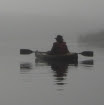- Grow a garden. Yes, you. This has finally started to turn up on a few lists, long overdue, but it's usually way too far down the list. Don't have a bit of land? (Are you sure? Think small, even a planter or a window box.) Help a friend. Get a community garden plot, and again, maybe go together with a friend on this. The most important tip for a beginning gardener: start small. It might seem insignificant, but you will be surprised at what you can produce. And transportation of fresh produce is a big part of our ecological footprint, so a successful small beginning at gardening may have just as much impact as any other green project you could do.
- Take up hunting or fishing. Yes, you. Yes, kill something. Do it close to home, and you will have to learn about the natural habitats of your own area, where they are, what sustains them, and what threatens them. They need you.
- Eat what you kill.
- Eat smaller portions of meat: a piece about the size of your palm and the thickness of your pinkie finger is plenty, even with all that vigorous gardening and hunting you will be doing.
- If your hunting and fishing doesn't fill your reduced meat needs, look for domestic meats that are grown locally in harmony with the natural habitats you learned about in #2. In my area, that means range-fed beef, which uses self-guided cow-power to harvest and fertilize natural grassland instead of plowing it up and using fossil fuels to cultivate and fertilize grain crops.
- If, after all this new recharge time you are spending in your garden, on the trail of a deer, or on the water with your fishing rod, you still feel the need for a holiday from your life, take it close to home. Check out nearby parks, festivals, galleries - try your local tourism agency if you need ideas. Try something different: a bike tour, or paddling lessons; a retreat to learn about the enneagram; a music camp where you can learn to play an instrument.
- Buy less, but when you do buy, spend more. Buy quality, to last a lifetime. Help the economy shrink back so it fits within the biosphere instead of mining the Earth.
- When giving gifts, show your caring through the time and thought you put in, instead of the dollars. In my family, for the last couple of years, CHRISTMAS stands for Consumeable (or Cookies), Homemade, Recycled (if you're not using it much but someone else would, why not?)... and I have been trying to extend the acronym to include Indirect (a gift to charity), and then the rest of the letters make an excuse for buying something Specific to that person and Terrifically Magically Awesomely Spectacular... such as the lightweight plastic trombone we found for my Mom to help her continue marching in parades well into her 70s.
- Don't have time for all this? Do it anyway, and with the money you save, quit working. Give up that second income, or the overtime. Change jobs if you need to. Take back your life.
- Tell your local political representatives what you are doing, and why. Destroy their argument that we can't make changes because the public won't change. Change, and show them.
why mulch?
2 months ago




